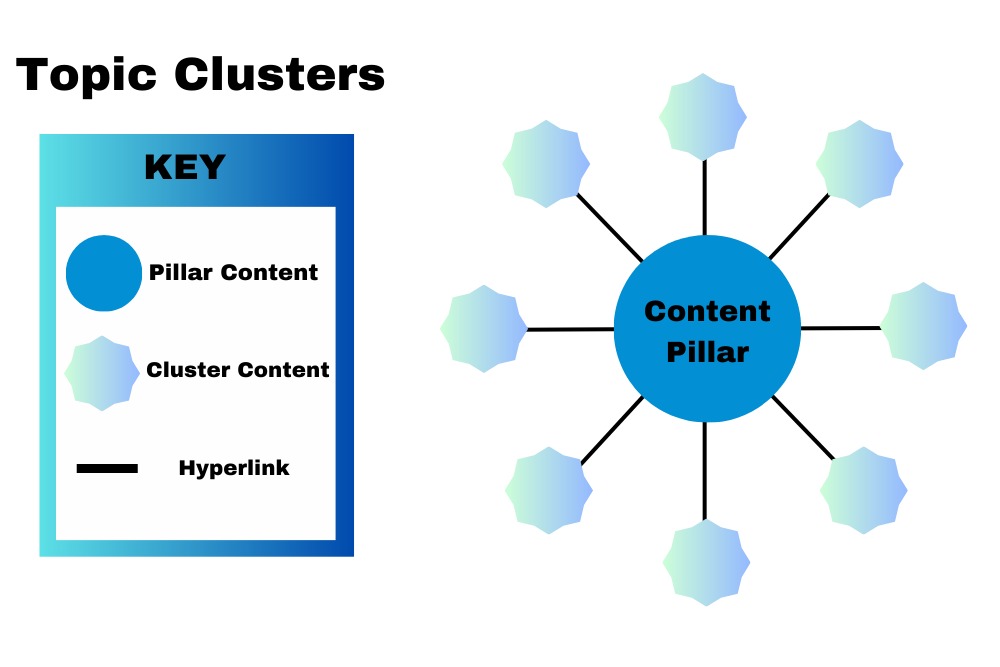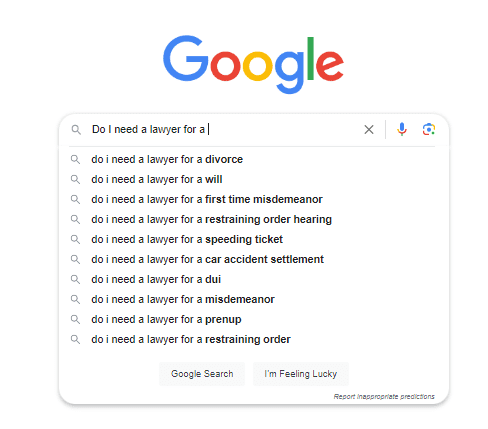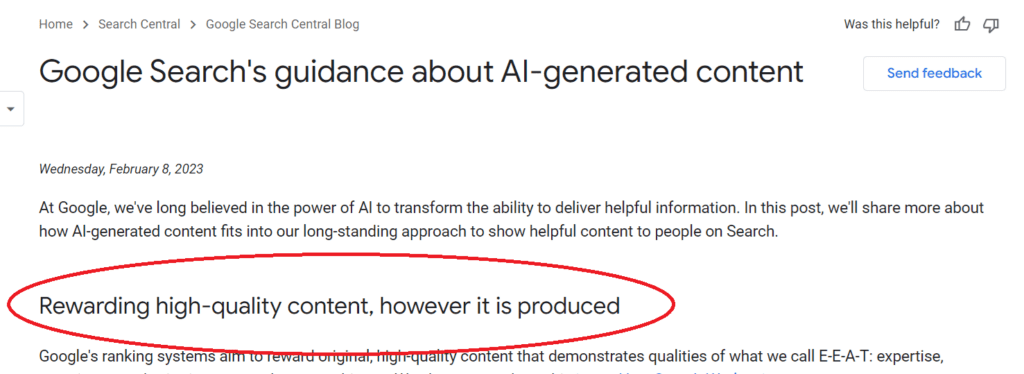- How to Start a Law Firm Blog that Improves Your SEO and Gets You Clients
- 9 STEPS TO START AND MAINTAIN A LAW FIRM BLOG
- Step 1: Identify Your Legal Niche
- Step 2: Create legal blog topics.
- Step 3: Craft Attention-Grabbing Legal Blog Titles
- Step 4: Conduct Strategic Keyword Research
- Step 5: Document Your Legal Blogging Strategy
- Step 6: Create Client-Centered Legal Blog Content
- Step 7: Publish and Optimize Your Legal Blog Post
- Step 8: Amplify Your Legal Blog Through Social Channels
- Step 9: Analyze and Refine Your Legal Blogging Results
- Consider Outsourcing to a Legal Content Marketing Agency
- How Lexicon Supports Your Legal Blogging Strategy
- LEGAL BLOGGING FAQs
- Need help with legal blogging? Call Lexicon today!
How to Start a Law Firm Blog that Improves Your SEO and Gets You Clients
At Lexicon Legal Content, we’ve spent the last 13 years witnessing first-hand how regualrly updated law firm blog doesn’t just enhance your search engine visibility—it establishes your practice as an authoritative resource in your practice areas.
Our Denver-based company began with a simple observation: many attorneys excel at practicing law but struggle with effectively marketing their expertise online. This insight led us to develop a specialized approach to legal content creation that has consistently delivered measurable results for our clients.
According to Backlinko’s March 2025 blogging statistics report, 70% of marketers say blog posts are the most effective content type when used for demand generation in the awareness stage. For more insights regarding the state of law firm blogging in 2025, check out founder David Arato’s article “Is Legal Blogging Still a Viable Client Acquisition Strategy in 2025?” in Attorney at Work magazine.
This means that by regularly creating high-quality blog content, law firms can connect with potential clients who are actively in the process of looking for a lawyer.
A strategic law firm blog doesn’t just enhance your search engine visibility—it establishes your practice as an authoritative resource in your specialty areas. By publishing valuable, informative content consistently, attorneys can significantly improve both their digital rankings and client acquisition rates.
While the benefits of blogging for law firms are substantial—from improved SEO performance to increased client conversions—many legal professionals struggle with developing an effective content strategy. Follow these 9 proven steps to launch a high-performing legal blog that attracts qualified prospects and showcases your expertise in today’s competitive digital landscape.
9 STEPS TO START AND MAINTAIN A LAW FIRM BLOG
Step 1: Identify Your Legal Niche
Identify a specialized focus for your law firm blog to help it stand out and attract a dedicated audience. This approach lets you target more specific keywords with less competition, improving your chances of ranking well and connecting with potential clients who need your expertise.
Start by considering which types of cases you most want to handle. For instance, if you practice personal injury law, you might focus on truck accidents or medical malpractice rather than injuyr cases generally. Similarly, a family lawyer could concentrate on high-net-worth divorce or child custody matters instead of broad family law topics.
By narrowing your focus, you can create more relevant content that directly addresses the specific legal issues your ideal clients are searching for online.
Step 2: Create legal blog topics.
Developing targeted blog topics is essential for enhancing your law firm’s digital presence. Look to client consultations for inspiration—the questions prospective clients consistently ask reveal valuable content opportunities. When potential clients wonder if their case might go to trial or what compensation they might receive, they’re signaling exactly what information they need.
Consider creating content that addresses these decision-stage questions:
- 5 Critical Questions to Ask Before Hiring a Denver Car Accident Attorney
- Uncontested Divorce in Colorado: When Legal Representation Makes Sense
- Evaluating DUI Defense Attorneys: What Credentials Actually Matter
- Chapter 7 Bankruptcy Filing: A Step-by-Step Guide for Colorado Residents
For additional topic ideas tailored to your practice area, you might explore specialized legal content generation tools that can help identify trending legal questions in your market.
Beyond these targeted topics, implementing effective content organization strategies will maximize your legal blog’s impact and reach. Consider these structural approaches to strengthen your content foundation:
Implement the Pillar-and-Cluster Strategy for Organized Legal Content
Structure your blog using the pillar-and-cluster approach to enhance both user experience and search visibility. Begin by developing comprehensive guide pages focused on your core practice areas—for example, a detailed overview of personal injury law or divorce proceedings. These pillar pages serve as authoritative resources that address broad topics in depth.
From each pillar, create supporting cluster content that explores specific aspects of the main topic. For instance, a personal injury pillar might connect to focused articles like “Documenting Injuries After an Accident,” “Understanding Comparative Negligence in Colorado,” and “Timeline of a Personal Injury Claim.” Include strategic internal links between these related pieces and your pillar content.
This methodical organization accomplishes two critical objectives: it creates a logical navigation path for potential clients seeking information, and it signals to search engines that your site contains authoritative, interrelated content on specific legal subjects.

Share Noteworthy Firm Developments
Keep your blog dynamic by incorporating significant firm updates that demonstrate your practice’s growth and success. Feature notable case victories, highlighting the challenges overcome and results achieved (while maintaining client confidentiality). Announce attorney additions, professional recognitions, or office expansions that reflect your firm’s evolution.
These strategic updates serve multiple purposes—they build credibility with potential clients by showcasing your capabilities, provide fresh content for search engines, and offer natural opportunities to reinforce your expertise in specific practice areas. When sharing these accomplishments, focus on the client benefits behind each development rather than simple self-promotion.
Connect Your Expertise to Timely Events
Incorporate relevant current events into your legal blogging strategy to increase visibility and demonstrate your firm’s awareness of issues affecting your community. When significant developments occur in your practice area or local region, promptly provide expert analysis that helps readers understand the legal implications.
For example, if your city passes new housing regulations, explain what landlords and tenants need to know; or if a major product recall affects local consumers, outline their legal rights. This approach—sometimes called newsjacking—can temporarily boost your search visibility as people seek information about breaking situations.
The key to success with this strategy is adding genuine value through your legal perspective rather than simply reporting news. By contextualizing events within your expertise, you position your firm as an informed, responsive resource during times when potential clients actively search for guidance.
Analyze Significant Legal Developments
Interpret important legal news by providing thoughtful analysis of relevant case decisions, legislative changes, and industry developments. When landmark rulings occur or new laws pass that affect your practice areas, break down the complex legal concepts into clear explanations that demonstrate your expertise.
For instance, explain how a recent Supreme Court decision might impact local business regulations, or how changes to state family law could affect divorce proceedings. This substantive commentary serves several valuable purposes: it showcases your professional knowledge, helps potential clients understand how legal changes might affect them, and positions your firm as a forward-thinking authority in your field.
This approach can also strengthen your professional network, as other attorneys may reference your insights or share your content with their own audiences, creating valuable referral opportunities and enhancing your firm’s reputation within the legal community.
Step 3: Craft Attention-Grabbing Legal Blog Titles
After developing your blog topics, focus on creating compelling headlines that capture reader interest and drive clicks. Your title is often the first—and sometimes only—element potential clients will see in search results, making it crucial for effective legal blogging.
Effective legal blog titles should balance several key elements:
- Incorporate search-friendly terminology: Frame titles using the actual phrases potential clients type into search engines
- Signal clear value: Communicate exactly what legal insights readers will gain
- Create specific expectations: Include numbers, timeframes, or jurisdictions when relevant
The most effective approach often involves transforming common client questions into direct titles. When someone searches “How long does a divorce take in Arizona?” and sees your article with that exact title, they’re more likely to click through, knowing your legal blog directly addresses their specific concern.
This strategic approach to legal blogging titles naturally aligns your content with search intent, which is critical for both ranking well and delivering the valuable legal information your potential clients are actively seeking.
Step 4: Conduct Strategic Keyword Research
While crafting valuable content for your readers remains paramount, understanding the specific search terms your potential clients use is essential for effective legal blogging. Keyword research provides critical insights into how people actually search for legal help online.
Begin by identifying primary keywords relevant to your practice areas, then explore related terms, questions, and variations. Focus on terms with reasonable search volume and manageable competition levels that align with your expertise. Look particularl for:
- Long-tail keywords that indicate specific legal needs
- Question-based phrases that signal information-seeking behavior
- Location-specific terms for your practice area
- Terms that indicate readiness to hire legal counsel
Tools like Google’s Keyword Planner, Ahrefs, or SEMrush can provide data on search volume and competition, but don’t overlook simpler approaches. Analyze Google’s autocomplete suggestions, “People also ask” sections, and related searches to understand the language real people use when seeking legal assistance.

Remember that effective legal blogging balances keyword optimization with providing genuinely helpful information. Your primary goal should be answering client questions thoroughly while naturally incorporating relevant terminology that helps your content get discovered.
Step 5: Document Your Legal Blogging Strategy
Establishing a well-defined content strategy is crucial for maintaining consistency and focus in your legal blog. This documented plan serves as a roadmap that guides your content creation efforts and helps measure success.
Create a comprehensive strategy document that includes:
- Audience profile: Define the specific client personas you aim to reach—their legal concerns, knowledge level, and decision-making factors
- Keyword framework: Organize your target keywords by practice area, search intent, and priority based on potential client value
- Publication calendar: Establish a realistic posting schedule that balances consistency with quality, whether weekly, bi-weekly, or monthly
- Content formats: Determine the types of content that will best serve your audience—guides, FAQ posts, case analyses, or legal updates
Having this structured approach allows you to maintain editorial consistency even when scaling your legal blogging efforts. It becomes particularly valuable when multiple attorneys contribute content or when working with outside writers who need clear direction on your firm’s voice and expertise focus.
Review and refine this strategy quarterly to ensure your legal blogging efforts continue to align with your firm’s business development goals and the evolving needs of your potential clients.
Step 6: Create Client-Centered Legal Blog Content
With your strategy in place, it’s time to develop content that resonates with potential clients. Legal blogging requires a fundamentally different approach than formal legal writing. Your readers aren’t fellow attorneys—they’re individuals seeking clear guidance during challenging situations.
When writing your legal blog posts:
- Prioritize clarity over complexity: Translate legal concepts into straightforward explanations without oversimplification
- Adopt a conversational tone: Write as if you’re speaking directly to someone sitting across from you
- Define terminology: Briefly explain legal terms that may be unfamiliar to non-lawyers
- Focus on practical implications: Emphasize how legal concepts affect readers’ real-world situations
Structure your content for digital consumption. Online readers typically scan for relevant information rather than reading linearly. Enhance readability by:
- Highlighting essential points or terminology
- Placing key takeaways at the beginning
- Using concise sentences and focused paragraphs
- Creating descriptive section headings that guide readers
- Breaking information into bulleted or numbered lists
Can you use AI to write content?
AI tools like ChatGPT can be valuable allies in your content creation process, offering assistance with outlines, structure, and overcoming writer’s block. However, publishing unedited AI-generated content directly to your legal blog is not recommended.
When incorporating AI in your legal blogging workflow:
- Use it to generate initial drafts or content frameworks
- Apply your professional expertise to verify legal accuracy and add jurisdiction-specific context
- Incorporate your firm’s unique perspective and case experiences
- Ensure the content reflects your authentic voice and communication style

Importantly, AI can make factual errors (called hallucinations), and the content it creates may not comply with state advertising rules. Always format your content for simple online reading.
Step 7: Publish and Optimize Your Legal Blog Post
Once your legal blog content is ready, follow these steps to effectively publish it on WordPress:
- Select “Post” from the dropdown
Before finalizing publication, implement these critical optimization steps:
Review Formatting
Ensure your content maintains consistent formatting throughout. WordPress sometimes alters paragraph spacing and list formatting, which can impact readability. Double-check that your headings follow a logical hierarchy (H2s, H3s) to structure your legal content effectively.
Apply Categories and Tags
Organize your legal blog posts with relevant categories (broad practice areas) and tags (specific legal concepts). This taxonomy helps readers navigate related content and assists search engines in understanding your site structure.
Include Relevant Imagery
Add a professional, relevant image to enhance visual appeal. For legal blog posts, consider using images that represent your practice area while avoiding cliché legal scales and gavels. Always include descriptive alt text for accessibility and SEO benefits.
Craft a Compelling Meta Description
Write a concise meta description (under 160 characters) that accurately summarizes your post and includes your target keyword. This snippet appears in search results and significantly influences click-through rates. Without a custom description, Google will generate one automatically, which may not highlight your key points effectively.
After completing these optimization steps, you can confidently publish your legal blog post, knowing it’s structured for both reader engagement and search visibility.

Step 8: Amplify Your Legal Blog Through Social Channels
After publishing your legal blog content, extend its reach through strategic social media distribution. Share your posts across platforms where your potential clients are active—typically LinkedIn, Facebook, Twitter, and potentially Instagram depending on your practice area.
For effective legal content distribution:
Tailor Your Approach by Platform
- Facebook: Focus on the human impact of legal issues
- Instagram: Use visuals that represent client situations or outcomes
Maintain Consistent Visibility
Implement a regular sharing schedule using tools like Hootsuite or Buffer to ensure your content reaches audiences at optimal times. Consider sharing each blog post multiple times with different framing to maximize exposure.
Foster Engagement and Conversation
Respond promptly to comments and questions on your shared posts. This engagement not only builds relationships but also increases the visibility of your content through platform algorithms.
Repurpose Content Strategically
Transform your comprehensive blog posts into platform-specific formats:
- Extract key statistics or insights for quick-view infographics
- Create brief video explanations of complex legal concepts
- Develop quote graphics highlighting critical takeaways
This multi-channel distribution approach amplifies your legal content’s impact, directs traffic to your website, and reinforces your position as a knowledgeable resource in your practice area.
Step 9: Analyze and Refine Your Legal Blogging Results
Consistently tracking your legal blog’s performance provides crucial insights to improve your content strategy and maximize client acquisition. Implement these monitoring practices:
Implement Comprehensive Analytics
Set up Google Analytics or a specialized SEO platform like Semrush to track essential metrics. Focus on:
- Page views and unique visitors
- Time spent on page and scroll depth
- Bounce rate and exit pages
- Conversion actions (consultation requests, downloads)
Evaluate Content Performance Analyze which legal topics and formats generate the strongest engagement and lead generation. This data reveals what information your potential clients find most valuable and which practice areas deserve additional content investment.
Track Search Visibility Monitor your keyword rankings to understand how effectively your content reaches potential clients. Identify emerging legal search trends and adapt your content strategy accordingly.
Optimize Based on Data Use performance insights to continuously refine your approach:
- Update underperforming content with enhanced information
- Expand successful posts with additional details
- Test different headlines and meta descriptions
- Experiment with various content formats
Expand Your Reach Through Guest Blogging
Complement your own legal blog with strategic guest posting on respected industry publications. This approach offers multiple benefits:
- Establishes your expertise with new audiences
- Expands your professional network within the legal community
Most publications don’t offer payment for guest content, but the exposure and SEO benefits provide substantial value. To find opportunities, research legal publications, industry associations, and business websites relevant to your practice areas. Look for “Write for Us” pages or contact editors directly with thoughtful pitch ideas that align with their audience’s interests.
When guest blogging, focus on providing genuinely valuable information rather than promotional content. This approach builds your reputation as a knowledgeable resource and encourages readers to learn more about your services.
Consider Outsourcing to a Legal Content Marketing Agency
When managing the demands of legal practice collides with content creation needs, consider delegating your legal blogging efforts to qualified professionals. Many successful attorneys find that their expertise is best utilized in client representation rather than content production.
Professional Legal Content Solutions
Maintaining consistent, high-quality legal blog content presents unique challenges that differentiate it from other industries. Legal content must:
- Maintain absolute factual and procedural accuracy
- Comply with your jurisdiction’s attorney advertising regulations
- Avoid potential ethical issues regarding client expectations
- Balance marketing effectiveness with professional standards
When selecting a content partner, prioritize services with:
- Experience working specifically with law firms in your practice areas
- Understanding of legal ethics requirements and bar advertising rules
- Demonstrated ability to translate complex legal concepts for client audiences
- Track record of improving search visibility for legal websites
Specialized legal marketing agencies can manage your entire content strategy, from topic identification through publication and promotion, while ensuring compliance with professional standards. This approach allows you to maintain a robust online presence without sacrificing billable hours or client service quality.
By strategically outsourcing your legal blogging efforts, you can focus on practicing law while still benefiting from the business development advantages of consistent, high-quality content.
How Lexicon Supports Your Legal Blogging Strategy
Now that you understand the essential steps for developing and maintaining an effective legal blog, you may be wondering how to implement this strategy efficiently while managing your law practice. At Lexicon, we offer specialized services designed specifically for attorneys and law firms looking to enhance their online presence through strategic content creation. Our comprehensive approach addresses each aspect of successful legal blogging, from ideation through optimization and analysis.
Our Services
We offer a range of services to help your law firm succeed online, including:
- Blogging for lawyers
- Legal content marketing
- Blog posting and optimization
- Content Ideation
- Law Firm FAQ Pages
- Google Analytics Reporting
The team consists of professional legal blog writers.
Finding qualified legal content creators can be challenging. At Lexicon Legal Content, we train our writing team in both SEO best practices and legal fundamentals. Most of our writers hold law degrees, ensuring accurate, authoritative content. We serve clients across all practice areas and in every state, creating customized blog posts based on topics you provide or developing strategic content tailored to your target practice areas. We can also handle direct posting to your blogging platform for a seamless experience.
LEGAL BLOGGING FAQs

Why should my law firm invest in guest posting on other websites?
Guest posting on established legal and business websites positions your firm as an authority in your practice area while building valuable backlinks. These high-quality backlinks are among Google’s top ranking factors and can significantly improve your website’s visibility. Additionally, guest posting exposes your expertise to new audiences who may not otherwise discover your services.
How does outsourcing blog content creation benefit busy law practices?
For attorneys balancing client obligations, court appearances, and practice management, consistent content creation is often impossible to maintain internally. Professional legal content services ensure regular publishing schedules without sacrificing quality. Specialized legal writers understand both attorney advertising rules and practice-specific nuances, helping you avoid ethical pitfalls while creating content that genuinely resonates with potential clients.
What strategies generate the most effective legal blog topics?
The most powerful blog topics address specific client pain points and search behaviors. Start by documenting frequently asked questions from initial consultations, identify keywords with strong intent but manageable competition, and organize content in thematic clusters. Focus particularly on topics that demonstrate both your expertise and your understanding of client concerns at different stages of their legal journey.
What specific optimization elements have the greatest impact on legal blog performance?
Beyond basic keyword placement, the most impactful optimization elements include: descriptive heading structures that organize content logically, schema markup that helps search engines understand your content’s context, comprehensive internal linking to related practice area pages, optimized images with descriptive alt text, and structured data implementation for FAQ content. These technical elements complement high-quality writing to maximize visibility.
How does Lexicon’s approach to legal content differ from general marketing agencies?
Unlike general marketing agencies that may apply standard content formulas across industries, Lexicon specializes exclusively in legal content creation. Our team includes attorneys and specialized legal writers who understand jurisdiction-specific considerations, ethical marketing requirements, and the nuanced language that resonates with legal clients. We combine this subject-matter expertise with data-driven SEO strategies tailored specifically for competitive legal markets.
Need help with legal blogging? Call Lexicon today!
In 2025, having a robust and regularly updated blog for your law firm will be crucial for online marketing. If you need help with content for your law firm’s website, you are in the right place. We have been helping law firms with their blogs for over a decade. While blogging for lawyers is a big part of what we do, we also provide various other content services, including practice area pages, press releases, white papers, and infographics. Call us today or contact us online to learn more!
About the Author
David Arato, JD, is the founder of Lexicon Legal Content, a specialized agency helping attorneys implement the legal blogging strategies outlined in this guide.
After recognizing how effective blogging can transform a law firm’s online presence, David assembled a team of former practicing attorneys who now exclusively create strategic legal blog content across all practice areas. His combined expertise in legal marketing and SEO helps law firms navigate the content creation process from niche identification through results analysis.
David regularly writes about legal content strategy for publications like Attorney at Work, where his insights on effective legal blogging have helped countless attorneys enhance their digital marketing efforts.